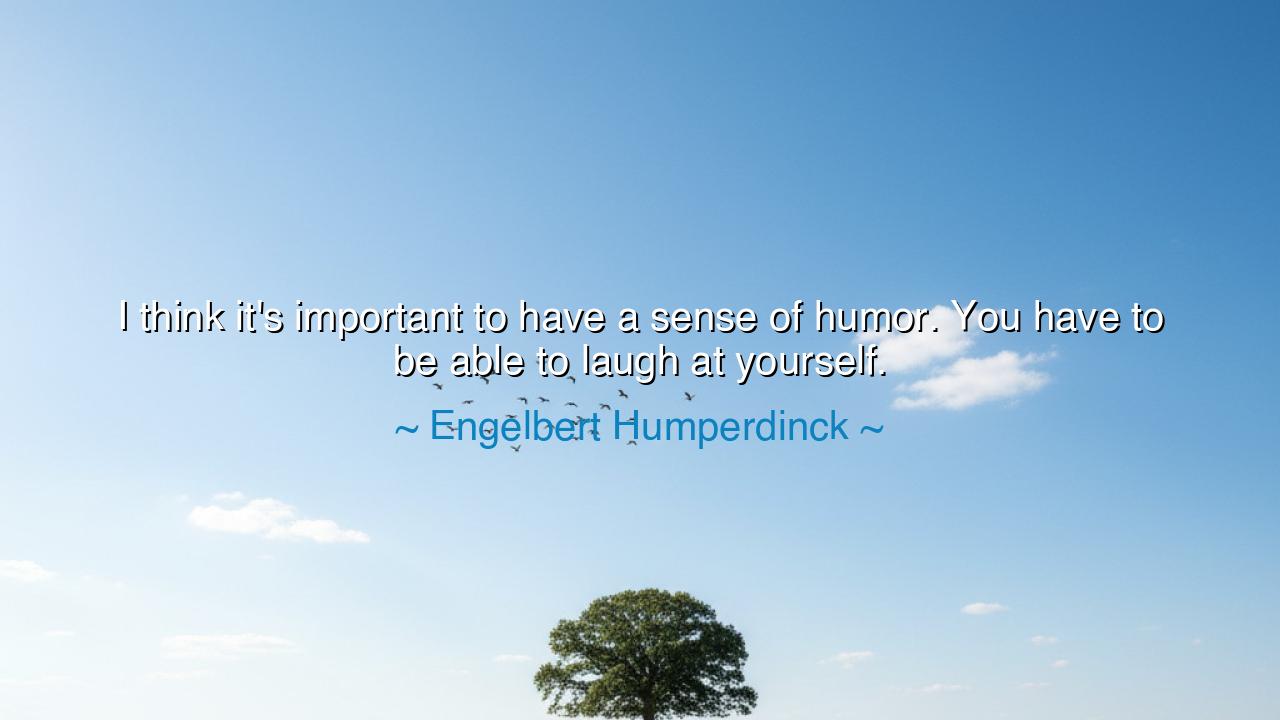
I think it's important to have a sense of humor. You have to be
I think it's important to have a sense of humor. You have to be able to laugh at yourself.






In the words of Engelbert Humperdinck, “I think it's important to have a sense of humor. You have to be able to laugh at yourself.” Though spoken simply, these words hold the wisdom of the ages, for they touch upon one of life’s most vital arts: the art of humility through laughter. To laugh at oneself is not weakness—it is strength. It is the act of freeing the soul from vanity and pride, of standing before one’s own imperfections without fear or shame. It is, in truth, the mark of a wise and peaceful heart.
In ancient times, the philosophers and poets often spoke of laughter as a gift from the gods. Aristotle himself declared that humor was what separated man from the beasts, for only man could look upon his folly and smile. Even in the oldest myths, laughter carried divine power: when Demeter, goddess of the harvest, grieved for her lost daughter, it was laughter that broke her despair and restored fertility to the earth. Thus, from the very dawn of thought, mankind has known that laughter heals and humbles, and that to laugh at oneself is to accept the imperfection woven into the fabric of being human.
Consider the tale of Diogenes the Cynic, that strange and brilliant philosopher of ancient Greece. He lived in a barrel, mocked the powerful, and held no illusions about the grandeur of mankind. When Alexander the Great came to visit him, offering to grant any wish, Diogenes replied only, “Stand aside; you’re blocking my sunlight.” The crowd laughed, and so did he—for he knew that the world’s pomp was fleeting, and that true freedom lay in seeing oneself clearly. To laugh at oneself, as Humperdinck teaches, is to live with the same courage: to take neither failure nor success too seriously, and to remember that life’s truest strength lies not in perfection, but in acceptance.
When Engelbert Humperdinck speaks these words, he speaks not as a philosopher, but as an artist—a man who has stood beneath the lights of fame, where pride and image often rule. In such a world, laughter becomes an armor of the soul. For fame, like fortune, is a double-edged sword: it exalts, but it also exposes. To laugh at oneself amidst applause and criticism alike is to remain grounded, to remember that the heart must not grow too proud, nor too fragile. Humor, then, becomes a kind of wisdom, a quiet discipline that keeps the ego humble and the spirit light.
Even the greatest leaders of history have known this truth. Abraham Lincoln, burdened by war and the weight of his nation, often turned to humor to ease the strain. Once, when accused of being two-faced, he replied, “If I had two faces, do you think I’d be wearing this one?” The laughter that followed did not lessen his dignity—it deepened it. For laughter reveals sincerity; it strips away pretense and shows the heart as it is. It reminds us that strength without softness becomes tyranny, and that wisdom without joy becomes cold.
To laugh at oneself is to refuse the tyranny of perfection. It is to see one’s mistakes, one’s quirks, one’s foolishness, and to say, “Yes, this too is me.” The ancients would call this sophrosyne—the virtue of self-knowledge, the balance between pride and humility. For when we laugh at ourselves, we dissolve the walls between us and others. We become more human, more forgiving, more connected. Humor, in this sense, is not just a social grace—it is a spiritual practice, one that lightens the heart and brings peace to the mind.
So let this be the teaching handed down: Cherish your sense of humor, and wield it gently upon yourself. Do not hide from your mistakes—smile at them. When life humbles you, laugh; when pride whispers that you are above laughter, laugh louder still. For laughter is the echo of wisdom, and humility is the crown of the wise. As Engelbert Humperdinck reminds us, those who can laugh at themselves will never fall too far, for they have already learned to rise with grace. And in that laughter—simple, human, eternal—we find not just humor, but healing.






AAdministratorAdministrator
Welcome, honored guests. Please leave a comment, we will respond soon